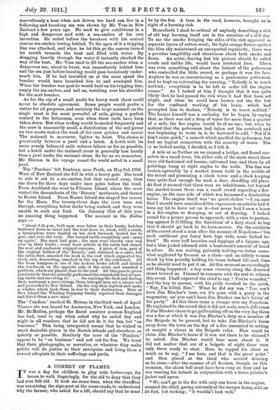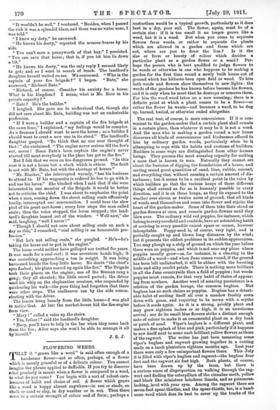A COMEDY OF FLAMES.
IT was a day for children to play with buttercups, for lovers to walk lingeringly, for the old to deny that they had ever felt old. It took me some time, when the chauffeur was examining the sign-post.at the cross-roads, to understand why the farmer, who asked for a lift, should say that he must
be by the fire. A. turn in the road, however, brought us in sight of a burning rick.
Henceforth I shall be critical of anybody describing a rick of old hay burning itself out in the sunshine of a still day.
To me the smoke fringing the sides of the rick appeared as separate layers of cotton-wool ; the light orange flames against the blue sky maintained an unexpected regularity; there was a peculiar tangibility and cleanliness about both smoke and flame. An artist, fearing lest his picture should be called crude and unlike life, would have hesitated here. There was even something odd about the helmet of the policeman who controlled the little crowd, or perhaps it was his face. Anyhow he was as unconvincing as a pantomime policeman, and he kept on reiterating the warning, "Nobody is to touch nothink; everythink is to be left in order till the engine comes." As I looked at him I thought that it was quite likely that he had passed the rick when it had first been set alight, and when he could have beaten out the fire but for the confused working of his brain, which had prompted him to declare, "Nobody is to touch nothink."
The farmer himself was a curiosity, for he began by saying that, as there was not a drop of water for more than a quarter of a mile, the fire engine would be of no use ; but, when he noticed that the policeman had taken out his notebook and was beginning to write in it, he hastened to add, " Not if it
don't come quick," a remark which pacified the policeman, but had no logical connection with the scarcity of water. The EC ne lacked sanity, I decided, as I left it.
A mile or so further on we crossed a bridge, and found our- selves in a small town. On either side of the main street there were old-fashioned red houses, enlivened here and there by oil paintings hung at right angles to the walls. The line was broken agreeably by a market house built in the middle of the street and possessing a clock tower and a clock keeping time quite fast enough for such a dear, dawdling old place. At first it seemed that there were no inhabitants, but beyond the market-house there was a small crowd regarding a fire- engine, on the near side of which was harnessed a diminutive horse. The engine itself was "no great shakes "—I am sure that I should have considered this expression unsuitable had it been my lot to have sat on it—but never had I seen a horse in a fire-engine so drooping, so out of drawing. I looked round for a proper person to approach, with a view to protest- ing against it fulfilling the functions of a fiery steed, to beg that it should go back to its lawn-mower. On the outskirts of the crowd stood a man after the manner of Napoleon—" his neck outthrust you fancy how, legs wide, arms locked be- hind." He wore buff breeches and leggings of a bygone age, but a blue jacket adorned with a boatswain's amount of braid in silver. He was waiting, patiently waiting—a virtue some- what neglected by firemen as a class—and an elderly woman stood by him proudly bolding his brass helmet till such time as he should need to put it on. At this moment an exceedingly odd thing happened : a boy came running along the deserted street toward us. I turned in common with the rest to witness this event. I half expected the chief to say, You're wounded," and the boy to answer, with his pride touched to the quick, "Nay, I'm killed, Sire." What he did say was, " You can't have Jim Blacker's 'orse, cos it's gone with a party in the wagonette; an' you can't have Jim Blacker cos he's drivin' of the party." At this there came a change over my Napoleon.
He explained to the crowd that it did not make much difference if Jim Blacker chose to go gallivanting off on the very day there was a fire at which it was Jim Blacker's duty as a member of the Brigade to be present, but to take Jim Blacker's horse away from the town on the day of a fire amounted to setting at naught a clause in the Brigade rules. How could he
claim Jim Blacker's horse if it was not there to be claimed P he asked. Jim Blacker would hear more about it. It
did not matter that out of a brigade of eight there were only three ready to start. Here he tapped his chest so much as to say, "I am here, and that is the great point,' and then glared at the third who arrived dressing as he came—after the manner of all firemen, though, on this occasion, the alarm bell must have been rung an hour and be was wearing his helmet in conjunction with a house painter's jacket and apron.
" We can't go to the fire with only one horse in the engine, moaned the chief, gazing solemnly at the meagre horse, still on its feet, but rocking; "it wouldn't look well." "It wouldn't be well," I ventured. "Besides, when I passed the rick it was a splendid blaze, and there was no water near, I was told."
" I know my duty," he answered.
" He knows his dooty," repeated the armour-bearer by his side.
" You can't save a pennyworth of that hay," I persisted. "You can save that horse; that is, if you let him lie down a bit."
" He knows his dooty," was the only reply I seemed likely to get; and so I went in search of lunch. The landlord's daughter herself waited on me. We conversed. " Who is the captain of your fire brigade ?" I began. "Bate," she answered, " Richard Bate."
" Richard, of course. Consider his anxiety for a horse. What is his kingdom ? I mean, what is Mr. Bate in his private capacity ? "
" Bate ? He's the builder."
I laughed. She gave me to understand that, though she did not care about Mr. Bate, building was not an undesirable profession.
" If I were a builder and a captain of the fire brigade at the same time," I explained, " my feelings would be complex. As a fireman I should want to save the house ; as a builder I should want to erect a new one in its stead." The landlord's daughter gasped. " To think that no one ever thought of that !" she exclaimed. " The engine never arrives till the fire's out, never ! Since Bate's been captain the engine's never started till most everybody in the place has got to the fire."
But I felt that we were on too dangerous ground. "In this case it is not a house but a stack which is ablaze. The fault is not with Mr. Bate, but with the shortage of horses."
" Mr. Blacker," she interrupted warmly, "has his business to attend to. If his wagonette is ordered he has to go with it and use his horse." She blushed when I said that if she were interested in one member of the Brigade it would be better not to criticize the chief. I was about to emphasize the point when a man, coming down the street calling coals offensively loudly, interrupted our conversation. I could hear the slow plod of his great cart-horse ; every four steps the man called coals ; then the voice stopped, the horse stopped ; the land- lord's daughter leaned out of the window. " Well now," she said, laughing, " well I never l" " Though I should not care about selling coals on such a day as this," I remarked, " coal selling is an honourable pro- fession."
Bat he's not selling coals," she gurgled. " He's—he's taking the horse out to put in the engine."
The horse could neither have galloped nor trotted for years. It was made for a coal-cart: it was seventeen hands high ; it was something approaching a ton in weight. It was being harnessed beside the limp little horse. No doubt "the chief's eyes flashed ; his plans soared up again like fire." The Brigade took their places on the engine ; one of the firemen rang a gong ; they all shouted ; the little crowd parted ; the driver used his whip on the elephantine creature, who responded by quickening his walk—the poor thing had forgotten that there were other steps. The coalheaver ran by the side remon- strating with the driver.
The traces hung loosely from the little horse—I was glad to notice that. At last-, the market-house hid the fire-engine from view.
" Mary !" called a voice up the stairs.
"Yes, father !" said the landlord's daughter.
"Mary, you'll have to help in the bar when they come back from the fire ; Alice says she won't be able to manage it all by herself."
J. S. J. J. S. J.







































 Previous page
Previous page